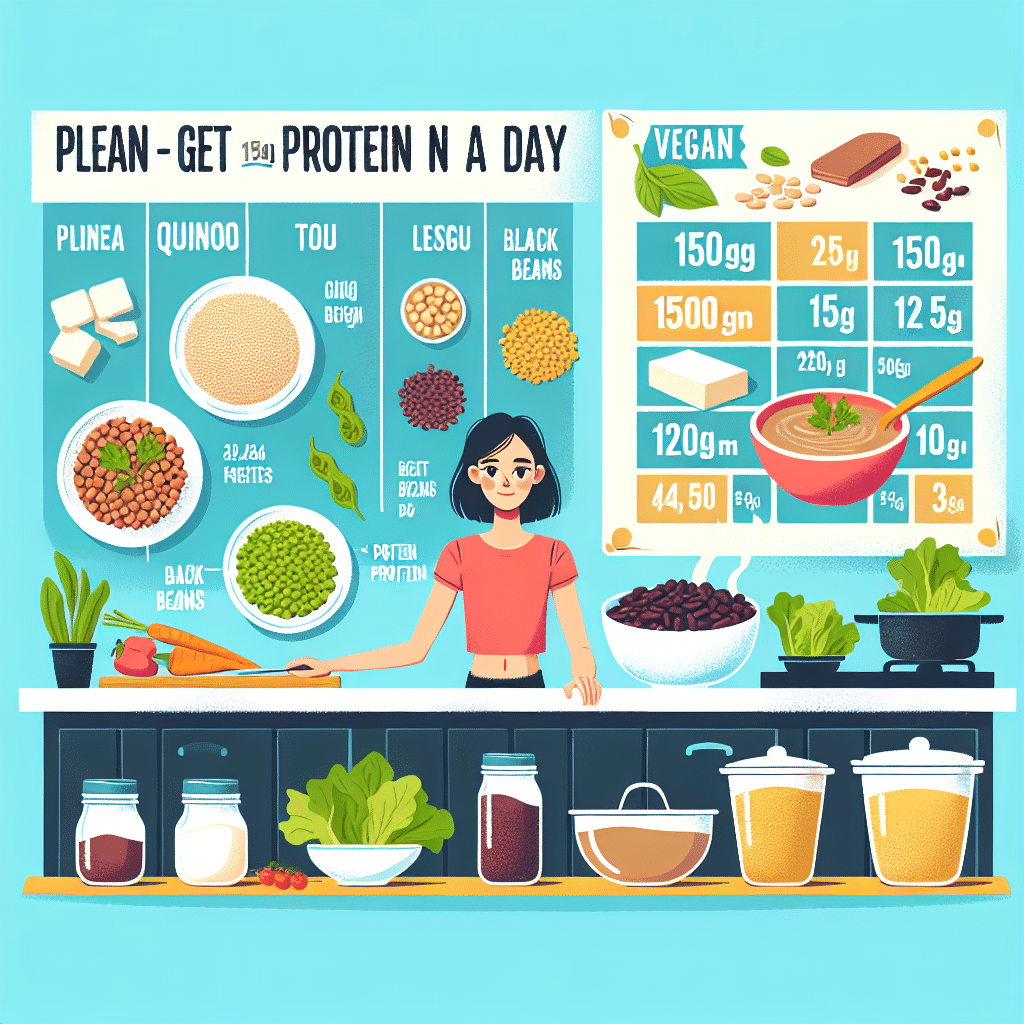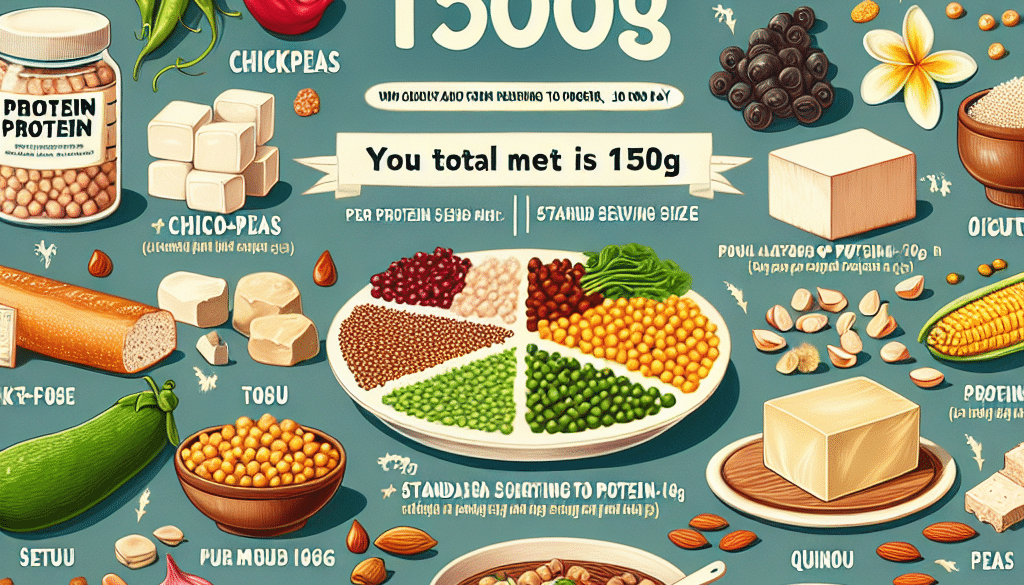How Can Vegans Get 150g Protein A Day?
-
Table of Contents
- Maximizing Protein Intake: A Vegan’s Guide to 150g Daily
- Understanding Vegan Protein Sources
- Designing a High-Protein Vegan Meal Plan
- Breakfast: Protein-Packed Smoothie
- Lunch: Quinoa and Black Bean Salad
- Snack: Nutty Trail Mix
- Dinner: Tofu Stir-Fry with Brown Rice
- Evening Snack: Protein Bar or Shake
- Supplementing with Vegan Protein Powders
- Challenges and Considerations
- Conclusion: Achieving Your Protein Goals as a Vegan
- ETprotein: Your Partner in Plant-Based Nutrition
Maximizing Protein Intake: A Vegan’s Guide to 150g Daily

For vegans, meeting high protein requirements can seem daunting, especially when aiming for a target as ambitious as 150 grams per day. However, with careful planning and knowledge of high-protein plant-based foods, it’s not only possible but can also be delicious and varied. This article will explore how vegans can achieve this goal, ensuring they meet their nutritional needs for muscle building, maintenance, and overall health.
Understanding Vegan Protein Sources
Protein is an essential macronutrient made up of amino acids, the building blocks of our body’s tissues. While animal products are known for their high protein content, there are plenty of plant-based options that can help vegans reach their protein goals.
- Legumes: Beans, lentils, chickpeas, and peas are excellent sources of protein.
- Nuts and Seeds: Almonds, peanuts, flaxseeds, chia seeds, and hemp seeds are not only high in protein but also provide healthy fats.
- Whole Grains: Quinoa, buckwheat, and whole wheat products contain significant amounts of protein.
- Soy Products: Tofu, tempeh, and edamame are soy-based foods that are complete proteins, meaning they contain all nine essential amino acids.
- Meat Substitutes: Seitan and commercially available vegan meats are often made from wheat gluten or soy and are designed to mimic the protein content of animal meat.
- Protein-Rich Vegetables: Spinach, broccoli, and Brussels sprouts have higher protein content compared to other vegetables.
Designing a High-Protein Vegan Meal Plan
Creating a meal plan is crucial for reaching a high protein intake. Here’s a sample day that includes 150 grams of protein:
Breakfast: Protein-Packed Smoothie
- 1 cup of soy milk (8g protein)
- 1 scoop of vegan protein powder (20g protein)
- 2 tablespoons of peanut butter (8g protein)
- 1 tablespoon of chia seeds (3g protein)
- 1 banana for natural sweetness and energy
Total protein: 39g
Lunch: Quinoa and Black Bean Salad
- 1 cup of cooked quinoa (8g protein)
- 1 cup of black beans (15g protein)
- Mixed greens and colorful veggies for nutrients
- 1 ounce of pumpkin seeds (5g protein)
- Lemon-tahini dressing for flavor
Total protein: 28g
Snack: Nutty Trail Mix
- 1/4 cup of almonds (7g protein)
- 1/4 cup of sunflower seeds (6g protein)
- 1/4 cup of dried cranberries for a touch of sweetness
Total protein: 13g
Dinner: Tofu Stir-Fry with Brown Rice
- 1 block of firm tofu, pressed and cubed (20g protein)
- 2 cups of mixed stir-fry vegetables (5g protein)
- 1 cup of cooked brown rice (5g protein)
- Stir-fry sauce of choice for flavor
Total protein: 30g
Evening Snack: Protein Bar or Shake
- 1 vegan protein bar or shake (20g protein)
Total protein: 20g
By the end of the day, you’ve reached a total of 130 grams of protein. You can easily add another 20 grams by incorporating additional snacks like edamame, hummus with whole grain pita, or another serving of nuts or seeds.
Supplementing with Vegan Protein Powders
While whole foods are the best source of nutrients, vegan protein powders can be a convenient and efficient way to boost your protein intake. They can be especially useful for those with high protein needs or limited time for meal preparation. Look for powders made from pea, rice, hemp, or mixed plant proteins to ensure a complete amino acid profile.
Challenges and Considerations
It’s important to note that while reaching 150 grams of protein is achievable, it may not be necessary for everyone. Protein needs vary based on factors like age, sex, weight, and activity level. It’s also crucial to balance protein with other nutrients and not to consume excessive amounts, which can strain the kidneys over time.
Conclusion: Achieving Your Protein Goals as a Vegan
Getting 150 grams of protein per day as a vegan requires planning and knowledge of high-protein foods. By incorporating a variety of plant-based proteins into your diet and utilizing supplements when necessary, you can meet your protein needs for muscle building and overall health.
ETprotein: Your Partner in Plant-Based Nutrition
If you’re looking to supplement your vegan diet with high-quality protein powders, ETprotein offers a range of organic bulk vegan proteins that can help you reach your daily goals. Their products are non-GMO, allergen-free, and come with a neutral taste, making them an excellent addition to any meal or snack.
About ETprotein:
ETprotein, a reputable protein and L-(+)-Ergothioneine (EGT) Chinese factory manufacturer and supplier, is renowned for producing, stocking, exporting, and delivering the highest quality organic bulk vegan proteins and L-(+)-Ergothioneine. They include Organic rice protein, clear rice protein, pea protein, clear pea protein, watermelon seed protein, pumpkin seed protein, sunflower seed protein, mung bean protein, peanut protein, and L-(+)-Ergothioneine EGT Pharmaceutical grade, L-(+)-Ergothioneine EGT food grade, L-(+)-Ergothioneine EGT cosmetic grade, L-(+)-Ergothioneine EGT reference grade and L-(+)-Ergothioneine EGT standard. Their offerings, characterized by a neutral taste, non-GMO, allergen-free attributes, with L-(+)-Ergothioneine purity over 98%, 99%, cater to a diverse range of industries. They serve nutraceutical, pharmaceutical, cosmeceutical, veterinary, as well as food and beverage finished product distributors, traders, and manufacturers across Europe, USA, Canada, Australia, Thailand, Japan, Korea, Brazil, and Chile, among others.
ETprotein specialization includes exporting and delivering tailor-made protein powder and finished nutritional supplements. Their extensive product range covers sectors like Food and Beverage, Sports Nutrition, Weight Management, Dietary Supplements, Health and Wellness Products, and Infant Formula, ensuring comprehensive solutions to meet all your protein needs.
As a trusted company by leading global food and beverage brands and Fortune 500 companies, ETprotein reinforces China’s reputation in the global arena. For more information or to sample their products, please contact them and email sales(at)ETprotein.com today.












